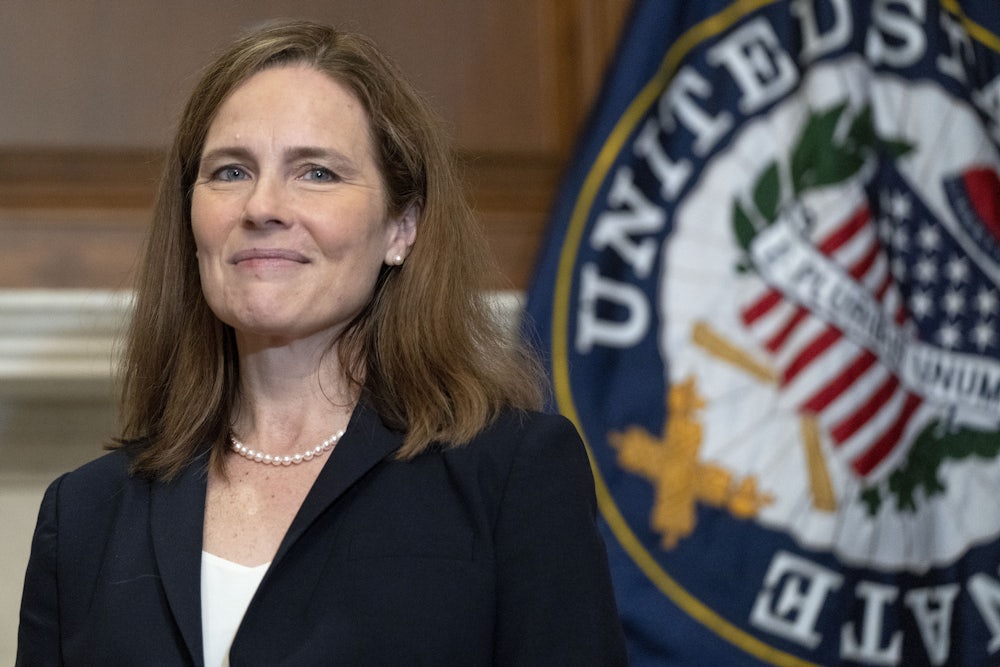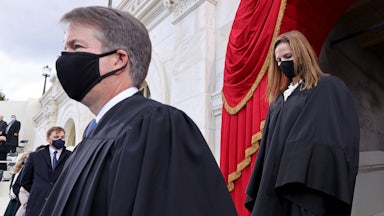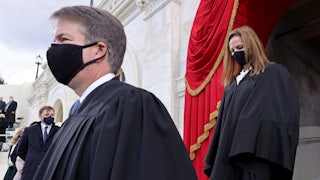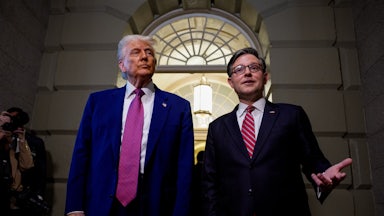The Supreme Court is already set to hear a major case on abortion rights, Jackson Women’s Health Organization v. Dobbs, later this year. It’s widely believed that the court’s six-justice conservative majority could hand down a ruling that sharply limits or overturns Roe v. Wade—an outcome that the state of Mississippi and its allies explicitly asked for last month. But it turns out that the court may have an even earlier chance this week to signal how far it will go to dismantle abortion rights.
The case, Whole Woman’s Health v. Jackson, involves a Texas law known as S.B. 8. It was signed into law in May and is set to go into effect on September 1. S.B. 8 aims to effectively ban abortions after doctors can detect cardiac activity in the fetus, which usually occurs around six weeks after conception. In practical terms, the new law is a near-total ban on abortion since it falls well before most women realize they are pregnant.* And in legal terms, it plainly violates the Supreme Court’s rulings on abortion rights since Roe was decided by effectively banning abortions that take place prior to viability.
There’s a familiar rhythm to these cases, especially over the past decade: Anti-abortion state lawmakers pass a bill that explicitly restricts the procedure beyond what Roe and Planned Parenthood v. Casey would allow. Sometimes these laws are straightforward bans on abortion past a certain number of weeks, as in Dobbs. In other cases, the laws rely on the state’s health and safety powers to impose rules that make it impossible for abortion clinics to operate lawfully within the state, like the Texas law struck down in Whole Women’s Health v. Hellerstedt in 2016 or the Louisiana law struck down in June Medical Center v. Russo last year.
So what makes S.B. 8 so different? Most abortion-related cases, including the ones I mentioned above, involve state and local officials who try to impose limits on access to the procedure. S.B. 8 takes a more convoluted approach. The statute is instead enforced by private citizens, who are empowered to file a civil lawsuit in Texas state courts against anyone who has performed an abortion or assisted in its performance, or who may do so in the future. In fact, the statute explicitly forbids state and local officials from filing the lawsuits themselves.
State courts must then issue an injunction against the defendant to bar them from doing so in the future. Under S.B. 8, the abortion provider or assistant must also pay the person who sues them at least $10,000—a state-mandated bounty for anti-abortion litigation, if you will. It’s not unusual for states to create causes of action so that citizens can sue one another. But it’s striking to see that power weaponized for culture-war fodder. Imagine if a state legislature allowed vaccinated people to sue their unvaccinated neighbors and co-workers, or if state legislators authorized drive-by lawsuits against gun stores that sold handguns and certain types of rifles.
Why did Texas lawmakers choose this approach? As Slate’s Dahlia Lithwick and Mark Joseph Stern noted on Monday, S.B. 8 is essentially designed to act as an “Escher staircase” for abortion-rights groups who want to challenge the law in court. “Typically, when a state restricts abortion, providers file a lawsuit in federal court against the state officials responsible for enforcing the new law,” they wrote. “Here, however, there are no such officials: The law is enforced by individual anti-abortion activists. There’s no specific defendant to enjoin from enforcing the law.” At the same time, S.B. 8 would force Texas abortion clinics to play legal defense against the well-organized anti-abortion movement in the state, which is waiting to unleash a torrent of lawsuits once it takes effect.
“If permitted to take effect, S.B. 8 would immediately and catastrophically reduce abortion access in Texas, barring care for at least 85 percent of Texas abortion patients (those who are six weeks pregnant or greater) and likely forcing many abortion clinics ultimately to close,” a group of abortion providers told the Supreme Court in an emergency filing on Monday. “Patients who can scrape together resources will be forced to attempt to leave the state to obtain an abortion, and many will be delayed until later in pregnancy. The remaining Texans who need an abortion will be forced to remain pregnant against their will or to attempt to end their pregnancies without medical supervision.”
Those providers had filed a federal lawsuit earlier this summer against various state and local officials in Texas, as well as against a private citizen who they allege is planning such a lawsuit when S.B. 8 goes into effect. A federal district court in Texas rejected the officials’ motion to dismiss the case and scheduled a hearing to consider a preliminary injunction, which could have blocked S.B. 8 from going into effect across the state. Before that could happen, however, a conservative three-judge panel in the Fifth Circuit Court of Appeals froze all lower-court proceedings while it heard appeals on the motion to dismiss.
If all of this is a bit hard to follow, that’s because Texas lawmakers planned it that way. The Fifth Circuit’s order means that, absent the Supreme Court’s intervention, S.B. 8 will go into effect and immediate legal consequences for most abortion providers throughout the state will follow—with the ultimate goal of banning almost all abortions in Texas. Thanks to the way the law is designed, the Supreme Court can effectively allow S.B. 8’s enactment and nullify Roe in at least one state in the Union without writing a single word about Roe or Casey or undue burdens or medical autonomy.
To that end, Texas officials offered a wave of procedural defenses against the providers’ lawsuit in a brief filed Tuesday evening to the Supreme Court. They argue that the providers lack legal standing to sue them. There is no “case or controversy” under Article III for federal courts to adjudicate in this lawsuit, the state argued, because the basic dispute is between anti-abortion litigants and the clinics themselves. Texas also invoked sovereign immunity claims and judicial immunity claims in a bid to foil the litigation against the officials, among whom are a county judge and a county court clerk.
“There are many reasons that the [abortion providers] are not entitled to the extraordinary relief they seek,” Texas told the justices in their brief. “The most obvious is that [providers] seek an injunction from this court that would utterly fail to prevent any of the harm they claim will occur once Texas Senate Bill 8 becomes effective. This court cannot expunge the law itself. Rather, it can enjoin only enforcement of the law. But the governmental defendants explicitly do not enforce the law, and the private-individual respondent testified that he will not do so.”
A vote in favor of the Texas law would cap an extraordinary string of right-wing victories at the high court. In most years, the justices’ annual recess is a fairly placid time of year. But this August has proven to be different. Last week, the court struck down the Centers for Disease Control and Prevention’s national eviction moratorium almost two months after Justice Brett Kavanaugh warned the Biden administration that he would do so in June if it was renewed. And earlier this month, the justices effectively forced the Biden administration to keep enforcing the controversial “Remain in Mexico” policy crafted by the Trump administration during its border crackdowns.
But it might be the conservative majority’s handling of this case that sends the strongest signal about what it will do later this fall when it comes to abortion rights. If the justices block the Texas law from going into effect, it could suggest that they aren’t willing to move as far as many people expected to overturn Roe and Casey. But if the justices stand by as Texas effectively imposes a ban on most abortions performed in the state, then Roe may already be a dead letter. The only thing left for the Roberts court to do in Dobbs later this year would then be to write its epitaph.
* This piece originally mischaracterized the timing of the law.








